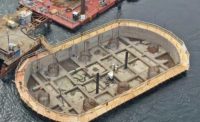Owners: Maine Dept. of Transportation; New Hampshire Dept. of Transportation
Lead Design Firms: Hardesty & Hanover; FIGG Engineering
General Contractor: Cianbro Corp.
Construction Engineer: McNary Bergeron
Engineering Support: Structural Technologies
Subcontractors: Case Foundation (Drilled Shaft); Shaw Brothers Construction (Earthwork); Atlantic Coast Dismantling (Demolition); Panatrol (Automation & Controls)
A key feature of this project is what the team says are the first precast concrete segmental towers on a vertical-lift bridge in the U.S. The team had planned to move the large segments from the Pittsfield, Mass., casting yard to the Portsmouth, N.H., and Kittery, Maine, project site via railroad. But 18 months into the project, the team still couldn’t secure needed railroad permits. That made it unclear whether the segments, which weigh as much as 80 tons, would arrive on time. At up to 13 ft, 6 in. tall, the segments were too tall to clear roadway overpasses and overhead utilities.
A Cianbro worker suggested trucking the units on their sides, says Kaven Philbrook, the company’s senior project manager. “Everyone looked at him and said, ‘Why wouldn’t that work?’ And away we go.” The plan involved custom mechanical tipping frames to lift and rotate the segments on and off the trucks. The frames also helped workers to place the segments on site. Trucking the units on their sides “saved the project, because the other delivery options were not going to work,” Philbrook says.
The 2,800-ft-long bridge has 500 post-tensioned precast concrete segments resting on concrete piers. The substructure and superstructure are supported by 29 10-ft-dia drilled shafts. The steel lift span is supported by four towers, each with 22 post-tensioned precast segments. To construct the towers’ foundations, the team installed post-tensioned precast concrete cofferdams, which were dewatered and filled with rebar and concrete. Precasting elements of the towers’ upper portions required an accelerated schedule, says Jim Bergeron, partner and principal engineer at McNary Bergeron. “It was a good team effort to keep the project on track.”
The $163-million project was completed with no liquidated damages, but the bridge opened seven months late. Cianbro claimed that design deficiencies resulted in increased costs and delays. The company received $5 million from the state transportation departments in a settlement.






